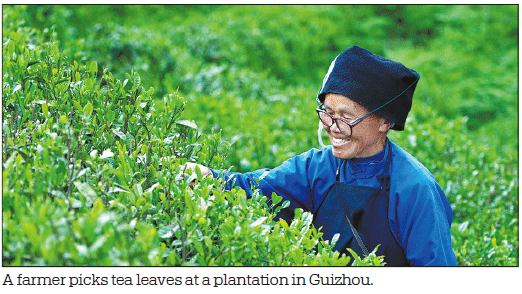Mountainous landscape, natural resources make region a paradise for tea
Farmers in Guizhou province are particularly happy with the arrival of the harvest festival this year.
In the past year, crops of tea, pepper, chestnut rose and dragon fruit in Guizhou all ranked first by volume in the country, while the value the province's agriculture industry created for related industries ranked among the top nationwide.
Guizhou, with an often unforgiving terrain, has achieved a historic breakthrough in agriculture.
The province has experienced a rural industrial revolution, which has added environmentally friendly momentum to the high-speed and high-quality development of its economy.
In 2018, 1.48 million people in Guizhou left poverty, lowering the poverty rate to 4.3 percent, and 14 poor counties were lifted out of poverty.
Relying on its abundant resources, Tongren city in Guizhou province is making significant achievements in poverty alleviation by cultivating distinctive industries, local officials said.
This year, the city has been focusing on the supply-side structural reform in the agriculture sector to revitalize its rural economy.
A poverty-stricken area in the Wuling Mountains, Tongren has a diverse terrain with mountains accounting for 67.8 percent of its total area.
Tongren has great potential to develop an efficient agricultural industry, with huge variations in altitude, biological diversity, clement weather and fertile land.
The city has developed a series of green agricultural products, such as Fanjingshan delicacies, which have created a number of products and local brands such as Fanjingshan Green Tea, Shiqian Moss Tea and Tongren Pearl Peanut.
Fanjingshan, listed as a UNESCO World Heritage site, has increased Tongren's popularity and reputation. Fanjingshan Green Tea ranked 31st in brand value in China's tea industry in 2018, with a brand value of 1.98 billion yuan ($277.48 million). Tongren's unique ecological resources created Fanjingshan Green Tea. Tongren has a tradition of tea-drinking since ancient times. "The tea here grows quite long, so we only take one bud and one leaf at a time when picking tea leaves. You can't pinch the tea leaves with your fingernails. Given the fact that we are surrounded by mountains with low temperatures and high humidity, the tea tastes very good", said You Hui, a local resident.
Shiqian county in the city is another region that has been committed to the aim of "agricultural clustering management, tea gardens as scenic spots as well as the integration of agriculture and tourism".
The county plans tea gardens at high locations, grows tea of high quality, and promotes the industry with significant investment. It makes use of classic tea gardens to drive development and transform old tea gardens.
At the same time, new tea is widely planted in suitable places, which gives new life to older tea gardens.
By the end of 2018, the area of tea gardens in Shiqian reached 388,000 mu, or 25,840 hectares, of which Shiqian Moss Tea accounted for 60 percent. There were more than 130 tea processing enterprises and 43 professional tea cooperatives, including six provincial-leading enterprises and 17 municipal ones. The number of people working in the tea industry reached 150,000, and the industrial scale ranked among the largest in Guizhou province.
Tongren is also exploring new approaches to lifting farmers out of poverty by helping poor households and encouraging farmers to play a role in the industrial chain of high-quality green agricultural products.
Statistics show by the end of 2018, the total area of tea plantations in Guizhou was 5,013 square kilometers, ranking first in the country for six years.
The total output of tea reached 3.62 million metric tons for a total production value of 39.4 billion yuan.
Guizhou has helped 152,000 impoverished people through the tea industry, of whom 89,000 people have been pulled out of poverty behind.
lixin2018@chinadaily.com.cn


(China Daily 09/30/2019 page18)














